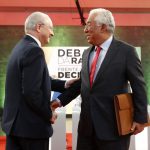Ukraine must win the war with Russia – but can or will the West sustain its support?
Five-hundred and ninety-six days have passed since Russia mounted its so-called ‘Special Military Operation’ against Ukraine which, as the whole world knows, was a full-scale invasion. The Ukraine ambassador to Portugal Maryna Mykhailenko addressed the International Club of Portugal on Thursday at the Lisbon Sheraton & Spa, and told business leaders her country was engaged in an existential battle for survival.
Text: Chris Graeme Photos: ICPT
It is nine years since Russia started its unprovoked and unjustified war against Ukraine with the illegal annexation of Crimea in 2014. It has become the largest and longest conflict in Europe since World War II and the bloodiest since the war in the Balkans during the early 1990s following the collapse of Yugoslavia.
It was not only a breach of the UN charter, but a violation of international law after Ukraine became independent in 1991, and Russia, UK and the United States swore to uphold its independence and territorial integrity in 1994 in a memorandum in return for Ukraine giving up its nuclear weapons and retaining a neutral stance as a non-NATO member.
“With every passing day it is becoming evident that Russia is committing every crime imaginable in Ukraine, including genocide”, said Maryna Mykhailenko.
Yet despite the odds, the Ukrainians have managed to hold the front line with both defensive and offensive operations mostly concentrated along a 600 mile stretch.
“We have already achieved results in some areas as the armed forces broke through the first line of Russian defences in the South. (In the Zaporizhzia region, in a sign that Kyiv is edging closer to Moscow’s sprawling network of fortified trenches along the southern front)
However, the main battles and results are still ahead as the two sides dig in for the winter, waiting for a spring offensive. “I am confident that skeptics will be surprised, and optimists will be rewarded in the following weeks,” said the ambassador.
“War is a very harsh teacher” she added. “It would be “unforgivable” in the face of the sacrifices by the Ukrainian people if lessons could not be learnt.
The Ukraine ambassador highlighted several such lessons: one – that consensus and appeasement does not work with Russia.
A common security space – a dream shattered
She highlighted the attempts to create the common security space from Vladivostok to Lisbon, and the large economic projects like Nord Stream II. “It was all for nothing. Time and again Russia has shown that it is not inclined to reciprocate and show good faith”.
That was a reference to a speech made by the then President of the European Commission, Durão Barroso who said: “European history and civilisation would be incomplete without Russia. Yes, Russia is a European country, and Russian history and civilisation cannot be dissociated from Europe and the cross fertilisation that happened over the centuries”.
He said at the time that the case for European Union-Russia engagement was “overwhelming”.
“Clearly we have a strong interest in building upon our economic interdependence and working ever-closer together in so many areas from trade and investment to energy and mobility, to good governance, human rights, humanitarian and world security issues”.
And then called for “a common economic and human space from Lisbon to Vladivostok with free travel of people, free exchange of goods and services, very close overall cooperation. This is our long-term vision”.
But, as the Ukraine ambassador pointed out, that dream is in tatters. “Russia’s approach to international relations are entirely incompatible with what democratic states and societies find acceptable. Russia does not share ethical values and principles.”
Instead, Maryna Mykhailenko said that Russia measures it security and status in terms of military power only, disrespecting the sovereignty and integrity of other nations. Disrespecting nations’ rights to self-determination, and the UN charter against of the threat and use of force, and agreements signed with other countries, and that Ukraine is the “best example of that”.
Constant violations
Since 2014, Russia has violated about four hundred different international treaties to which both states are parties.
In particular, the UN Charter; UN Convention for the Suppression of the Financing of Terrorism; the UN Convention on the Prevention and Punishment of the Crime of Genocide; Corpus of conventions governing the laws and customs of war; International Convention for the Protection of All Persons from Enforced Disappearance; Convention for the Protection of Cultural Property in the Event of Armed Conflict; UN Convention on the Elimination of All Forms of Racial Discrimination; and the UN Convention on the Law of the Sea.
“You cannot reach a consensus with those who seek to undermine democratic values and international laws, with those who want to kill you. As Golda Meir once said: “To be or not to be is not a question of compromise””.
The ambassador said that those suggesting that Ukraine accept an unfavourable cease-fire to give Russia a respite and then attack Ukraine and other neighbouring countries with renewed force would only make the conflict longer and bloodier.
The ambassador explained that the second lesson is to never “over-estimate” Russia. When Russia invaded Ukraine in February, 2022, many military expects felt it would have been “only a matter of days” until the second largest army in the world had conquered Ukraine.
In fact, most military analysts understood that Russia would have a hard time trying to control Ukraine with the forces it sent, and that the consensus was Ukraine would lose the conventional war, but Russia would not succeed in occupation.
Ukraine has put up a resistance that was not expected by many. The “resilience, resolve and fighting spirit” had been supported by western military support. “This support makes a difference on the battlefield every day”, she said.
Defence forces, she pointed out, were “actively dismantling Russia’s military machine”. As of October 284,000 Russian troops have been (estimated) to have been killed or injured since the invasion.
Cultivating myths and false narratives
Maryna Mykhailenko insisted that Russia continues to “cultivate the myth” that there is no chance to defeat them. (This is actually probably true without consistent and continued Western arms)
That either Russia wins the war or it will escalate to World War III, and that continued Western support only “escalates the situation and prolongs the conflict.”
“This Russian narrative only confirms that Russia desperately needs a break. Putin is suffering devastating setbacks but still believes he can outlast our resolve in the long term”, she added.
“Russia’s front line is heavily mined and it will take longer to break through than it did in the Kharkiv region. Support for Ukraine cannot be dropped now at this very decisive moment”, stressed the ambassador.
The statement was made as Russian troops launched a major offensive on the town of Avdiivka in eastern Ukraine. Three battalions involving some 2,000 troops, dozens of armoured vehicles as well as jets have been reportedly involved in what is described as the largest-scale attack in that area. The General Staff of Ukraine said they have managed to repel dozens of attacks in Avdiivka and nearby areas since Tuesday this week.
Impunity – the greater instigator of crime
The third lesson: Impunity is the greatest instigator of crime. The Russian invasion of Ukraine had triggered a massive violation of human rights as the UN Secretary General António Guterres has said.
The Ukrainians are currently investigating 110,000 war crimes and crimes against humanity, including the killing of 11,000 people including 504 children, and the wounding of over 17,000 civilians of which 1,129 are children.
“Russian forces have ravaged many parts of the country, torturing, raping, massacring, deporting and terrorising a vulnerable civilian population, and these figures do not yet take into account atrocities which have take place in the temporary occupied territories”. (Donetsk Oblast, Kharkiv Oblast, Kherson Oblast, Luhansk Oblast, Mykolaiv Oblast, and Zaporizhzhia Oblast)
And it is estimated that the Russian occupiers have deported nearly 200,000 children from Ukraine to Russia according to their own numbers while 90,000 have been documented by the Ukrainian authorities.
“This represents a deliberate ethnic cleansing campaign against the convention of the prevention and punishment of the crime of genocide, and Russian actions were strongly condemned by the Council of Europe, OECD and the G7”, said Maryna Mykhailenko.
The ambassador also said it was intolerable that the aggressors were allowed a permanent seat on he UN Security Council.
“When the aggressor continues to use the power of veto, to block access to prisoners of war, when Russia cannot be excluded from this organisation because there is no such procedure” she stated, calling for action on reform now at not at the end of the conflict.
Nato membership? A red line for Russia
On NATO membership, she said that had the decision been made in 2008 to let Ukraine eventually join, the war would have been avoided.
Russia’s logic here that it invaded because of NATO eastward expansion is shaped by history. “The Russian historical view is that every hundred years or so there’s an invasion from the West,” said Tomas Ries, associate professor at the Swedish national defence college in an interview with the Guardian after the invasion.
“From a Russian military perspective, I can understand that they were worried when Nato was enlarged,” he said, adding nonetheless: “The problem with this argument is that no one in their wildest dreams can imagine the West attacking Russia.”
Then there is the position of the newly independent states that joined Nato. “This wasn’t Nato trying to enlarge, this was countries hammering on the door saying let us in,” Ries said. “From our worldview, these are small countries that have good reason to be afraid of Russia.”
Immediately after the Bucharest Summit in 2008 NATO declared that both Ukraine and Georgia would join the US-led defence alliance – but gave them no plan for how to get there – Russia invaded Georgia and Crimea in 2014 when Ukraine had non-bloc status.
And according to historian John Mearshiemer – and to play devil’s advocate and, I should add, Essential Business does NOT agree this is a “valid justification” to invade a sovereign country –
the US and its European allies arguably “share most of the responsibility for the crisis”.
The root of the trouble for Russia, he says, is NATO enlargement, the central element of a larger strategy to move Ukraine out of Russia’s orbit and integrate it into the West.
At the same time, the EU’s expansion eastward and the West’s backing of the pro-democracy movement in Ukraine—beginning with the Orange Revolution in 2004—were critical elements, too. Since the mid-1990s, Russian leaders have “adamantly opposed NATO enlargement and in recent years, they have made it clear that they would not stand by while their strategically important neighbour turned into a Western bastion”.
For Putin, the illegal overthrow of Ukraine’s democratically elected and pro-Russian president—which he rightly labeled a “coup”—was the final straw. He responded by taking Crimea, a peninsula he feared would host a NATO naval base, and working to destabilise Ukraine until it abandoned its efforts to join the West. Putin’s pushback should have come as no surprise. After all, the West had been moving into Russia’s backyard and threatening it backyard says John Mearsheimer a foreign affairs strategy expert, a point Putin made emphatically and repeatedly.
But the Ukraine as a sovereign nation has every right to self-determination, to join both the EU and NATO if its people through its elected government so choose.
And was Russia justified in worrying that Ukraine might join Nato? Not really, according to Kristin Bakke, a professor in political science at UCL. “For a long time, support for Nato membership in Ukraine was about 30 to 40%,” she notes, adding that far more people wanted simply to remain neutral.
It wasn’t until last year that surveys showed more than half of Ukrainians wanting Nato membership. And by the time 100,000 Russian troops had amassed on the border, that number had risen to close to 60%.
Said the ambassador, “It is not true that NATO threatened Russia and that Russian aggression was provoked. This is another Russian narrative.”
EU succession?
“Opening EU succession talks will also send a clear signal that (application for EU membership) accession talks is an irreversible process. It will also give fresh energy and optimism to the Ukrainian people”.
And since all wars come to an end, in any peace deal who would broker it? Russia would not accept any EU country or the US and the West would not accept any of Russia’s allies such as Iran or China. Turkey has shown its appetite to be an honest broker. Turkey is a member of NATO but maintains cordial relations with Russia – one of its traditional trading partners.
Win or die?
But what would happen of Russia won the conflict. Ambassador Maryna Mykhailenko is in no doubt.
“Could you imagine how many people would die if Russia occupied our territory? This is our existential war. We have only two options: win or die. There is no other option for us. Russia should leave all our territories and all war crimes should be brought to justice and they should pay for the reconstruction of Ukraine”, she says.
At the end of the day, perhaps the ambassador is right and that there are only two essential scenarios for the course of Russia’s war against Ukraine. There is no “draw.” Any outcome other than a Ukrainian victory, as strategists define it, would qualify as a victory for Russia.
At the same time, Ukraine will not be able to win without the help of its Western allies. While already at historically high levels, this assistance remains insufficient to deliver a Ukrainian victory. And any compromise, frozen conflict or other form of stalemate means a Russian victory.
Perhaps neither Ukraine nor Russia will get to decide which of the two possible scenarios is realised. Both sides are doing and will do everything they can to win, and they cannot do much more than they are now doing. Instead, the winner will be decided by the West. The question is whether the West will understand that there are only two viable options and help Ukraine further and faster than it has done so far and that, right now, is far from clear.










